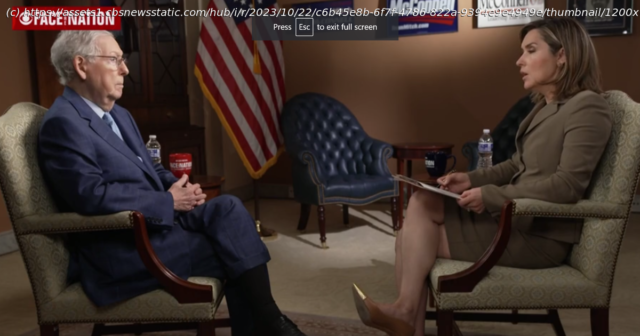On this “Face the Nation” broadcast, Secretary of State Antony Blinken and Senate Minority Leader Mitch McConnell join Margaret Brennan.
On this “Face the Nation” broadcast, moderated by Margaret Brennan:
Secretary of State Antony Blinken
Former Republican Rep. Liz Cheney
Senate Minority Leader Mitch McConnell
Philippe Lazzarini, commissioner-general of the United Nations Relief and Works Agency for Palestinian Refugees
Click to browse full transcripts of “Fac the Nation.”
MARGARET BRENNAN: Good morning, and welcome to Face the Nation. I’m Margaret Brennan in Washington.
There have been dramatic developments overnight in the Mideast, as the Israelis step up air and artillery strikes, now firing missiles into Southern Gaza, an area where they’d earlier urged residents to evacuate, as well as the occupied West Bank and two airports in Syria.
There are still five to 500 to 600 Americans trapped in Gaza and at least 10 Americans who are unaccounted for and potentially hostages of Hamas. Plus, there are clashes at Israel’s northern border with Lebanon, home to the Iranian-backed terror group Hezbollah.
Overnight, Defense Secretary Lloyd Austin deployed additional air defense systems in response to recent attacks on U.S. troops in the region.
We have a lot to get to today, but we begin in Israel with Charlie D’Agata.
(Begin VT)
CHARLIE D’AGATA (voice-over): The full force of Israeli airstrikes and artillery resumed overnight and this morning and a rare airstrike in the West Bank on a suspected Hamas terror cell in Jenin.
Two weeks of heavy bombardment has left Gaza in ruins, with a death toll that surpassed 4,300 people, another 13,000 injured. There had been a brief lull with the release of American hostages Judith Raanan and her daughter Natalie from Chicago, the first and only hostages to emerge from captivity.
Rescuing the rest in the middle of an expected full-scale invasion presents an unprecedented challenge, the former head of an Israeli special forces unit told us.
DORON AVITAL (Former Sayeret Matkal Commander): This is the responsibility of the state to 200 hostages, infants, wounded. There’s no way the country can move without taking this into consideration. This will be an element in the handling of the war.
CHARLIE D’AGATA: A war Israeli forces are readying more than 350,000 reservists for.
What we have witnessed is a steady buildup of hundreds of thousands of Israeli troops and heavy equipment like this in staging areas all pointed in one direction, about a mile from Gaza.
The stated aim of the complete destruction of Hamas means an invasion on a scale never seen here before.
Former Major General Israel Ziv once commanded Israeli forces in Gaza.
MAJ. GEN. ISRAEL ZIV (RET.) (Israeli Military): We’re completely changing the tactics. We’re going to use a lot of fire. We don’t want to play to their hands, to their traps, to whatever they prepare for us.
(End VT)
CHARLIE D’AGATA: This morning, the Israeli spokesman said that that strike on a suspected terrorist cell in Jenin eliminated what he called a ticking bomb, while the wave of attacks overnight in Gaza City resulted in the deaths of dozens of Hamas militants.
MARGARET BRENNAN: That’s Charlie D’Agata reporting from Tel Aviv.
Imtiaz Tyab spent time in Ramallah over the weekend. And he is back in West Jerusalem.
IMTIAZ TYAB: Well, across the Middle East and around the world, we have seen massive demonstrations in solidarity with Palestinians.
In London, over 100,000 people took to the streets of the British capital demanding an end to Israel’s war in Gaza. There’s also been similar scenes in Arab capitals, from Sanaa in war-torn Yemen, to Cairo, where the Egyptian president, Abdel Fattah El-Sisi called for a – quote – “day of rage” just hours after his phone call with President Biden earlier this week.
It was a phone call in which a deal was reached between Egypt, the U.S. and Israel to allow 20 trucks of desperately needed humanitarian aid into the Gaza Strip, which started arriving only yesterday.
On the Israeli-occupied West Bank, the violence there is only getting worse. We were at one protest where we witnessed Israeli snipers shoot at least three Palestinians.
Now, earlier, we spoke with Mustafa Barghouti, the president of the Palestinian National Initiative and a member of the Palestinian Legislative Council since 2006.
(Begin VT)
MUSTAFA BARGHOUTI (President, Palestinian National Initiative): I’m shattered. I’m angry, mainly because I don’t understand why this all should happen.
But what breaks my heart so much is the suffering of civilians, whether Palestinian or Israeli. And what I don’t understand, why the president of the United States comes here, and instead of telling Israel, enough is enough, you wanted to respond, you responded, you already killed 4,000 Palestinians, stop, instead of that, he’s encouraging them to have an invasion, a ground invasion.
IMTIAZ TYAB: So you think President Biden’s visit was a catastrophic mistake?
MUSTAFA BARGHOUTI: Catastrophic from three aspects. First, it was a huge political and diplomatic failure, as I told you, because nobody wanted to meet with him except Israelis.
Second, it’s a strategic mistake, because he’s dragging the United States into a very dangerous area where war crimes are committed, and, third, because he is consolidating the absence of peace process.
IMTIAZ TYAB: Do you see a scenario where this ends?
MUSTAFA BARGHOUTI: Yes, one scenario. There is no other scenario, immediate change of the behavior of Western leaders, who are now participating and encouraging Netanyahu to commit these war crimes, and, two – and the United States is the only country that has the real leverage over Israel.
And they should tell Israel, stop. Stop. Enough. Let’s have cease-fire. Let’s have immediate exchange of prisoners, so that all Israeli prisoners would come back home safe. And let’s initiate a true peace process to solve the roots of the problem, which is occupation and the system of apartheid.
(End VT)
IMTIAZ TYAB: Now, efforts to create a Palestinian state have been at a standstill for years now, largely because Israeli Prime Minister Benjamin Netanyahu’s successive hard-right governments have been firmly opposed to it.
And while the Biden administration continues to back calls for a peace process that would lead to a two-state solution, it’s done very little practically and diplomatically to advance that goal. And after Hamas’ brutal attack and a looming Israeli ground war in Gaza, it’s a goal that seems even further away than ever.
MARGARET BRENNAN: We go now to Secretary of State Antony Blinken, who is at the State Department.
Good morning to you, Mr. Secretary.
ANTONY BLINKEN (U.S. Secretary of State): Good morning, Margaret. Good to be with you.
MARGARET BRENNAN: Tension is very high in the region. Are you changing your security posture? Are you pulling any U.S. personnel out of the area?
SECRETARY ANTONY BLINKEN: Margaret, we are concerned at the possibility of Iranian proxies escalating their attacks against our own personnel, our own people.
We’re taking every measure to make sure that we can defend them and, if necessary, respond decisively, not at all what we’re looking for, not all we want, but we’ll be prepared if that’s what they choose to do.
MARGARET BRENNAN: So it sounds like quite possibly pulling people out.
In terms of the threat from Iran you just referenced there, President Biden in his Oval Office address said that the U.S. would hold Iran accountable. What does accountable mean?
SECRETARY ANTONY BLINKEN: Well, what you’ve seen already, Margaret, is very – a very clear message from the president, backed up by the deployment of two of our largest aircraft carrier battle groups, to make sure that it’s clear no one should take advantage of this moment to escalate further attacks on Israel or, for that matter, attacks on us, on our personnel.
And this is not by way of in terms of what we’re doing by provocation. It’s designed to deter, designed to make clear that no one should use this moment in any way to escalate.
MARGARET BRENNAN: We’ll stay tuned.
In terms of what’s happening in Gaza, I know there are an estimated 500 to 600 Americans there. Is there any chance Israel lets some of those Americans out or Egypt allows some of those Americans in?
SECRETARY ANTONY BLINKEN: You’re exactly right.
And to date, at least, Hamas has blocked them from leaving, showing once again its total disregard for civilians of any kind who are – who are stuck in Gaza.
MARGARET BRENNAN: Have you asked the Israeli government to delay in order to give you more time to broker the release of these hostages?
SECRETARY ANTONY BLINKEN: First, step back for a second, because it’s important to remember what happened.
It’s incredible how quickly that gets lost, because it was only a couple of weeks ago that Hamas invaded Israel with its terrorist fighters and slaughtered – and I use that – that word very deliberately – slaughtered so many people…
MARGARET BRENNAN: Right.
SECRETARY ANTONY BLINKEN: … again, men, women, young children, babies, old people, you name it.
And they continue to rain rockets down on Israel. When I was there. a few days ago, we were in the bomb – we were – we had to take shelter a couple of times,because of incoming rockets from Hamas.
MARGARET BRENNAN: Understood.
SECRETARY ANTONY BLINKEN: So, my point is this.
No country, no country can be expected to tolerate this, to live with this. And, as we said from the start, Israel has both the – the right and even the obligation not only to defend itself, but to try to make sure that, to the best of its ability, this can’t happen again.
So, we talk to the Israelis about what they’re – what they’re planning. We give them our best advice. It’s important, as we said, not only what they do, but how they do it, particularly when it comes to making sure that civilians are as protected as they possibly can be in this crossfire of Hamas’ making.
But in terms of what we’re talking to Israel about in their – with regard to their military operations, it really is focused on both how they do it, and how best to achieve the results that they seek.
MARGARET BRENNAN: So, let’s talk about how they do it.
You’re right to lay out just how absolutely horrific that attack was two weeks ago. Turning the page to what has happened during the following two weeks, UNICEF says 1,524 children have been killed in the Gaza Strip during these bombings.
Why isn’t the U.S. calling for at least a temporary cease-fire?
SECRETARY ANTONY BLINKEN: First, Margaret, when I hear the stories, when I see the pictures of young children who have lost their lives in this conflict of Hamas’ making, whoever they are, wherever they are, whether they’re Palestinians, whether they’re Israelis, whether they’re – they’re Jews or Muslims, it hits me, and I know it hits virtually everyone right in the heart.
And that’s why it’s so important to do everything possible to protect them and why it’s so important to do everything possible to get assistance to those who need it, food, medicine, water.
MARGARET BRENNAN: So, why not ask for at least a temporary pause in the bombing…
SECRETARY ANTONY BLINKEN: We’ve – we’ve seen…
MARGARET BRENNAN: … as was proposed at the U.N. this week?
SECRETARY ANTONY BLINKEN: We’ve seen, first of all, that, in order to get assistance in, we’ve had – we’ve had that happen. And you saw the first 20 trucks go in yesterday. I expect more will follow today and the day after that.
We want to make sure that we have sustained delivery of food, medicine, water, the things that people need. At the same time, I said something a minute ago that – that we have to – we have to remember. Israel has to do everything it can to make sure this doesn’t happen again.
Freezing things in place where they are now would allow Hamas to remain where it is and to repeat what it’s done sometime in the future. No country could accept that.
MARGARET BRENNAN: One of my colleagues who is on the ground in Israel and has traveled to the West Bank conducted an interview with Mr. Mustafa Barghouti, a Palestinian politician I’m sure you know.
He said he doesn’t understand why President Biden, when he was in Israel, did not say: “Enough is enough. You wanted to respond and you responded. You killed 4,000 Palestinians. Stop. Instead, you’re encouraging a ground invasion.”
How do you respond to “Enough is enough?”
SECRETARY ANTONY BLINKEN: Enough is enough should have been the case with – with Hamas two weeks ago.
It would be good to hear the entire world speaking clearly and with one voice about the actions that Hamas took, about the slaughter of people, about the fact that that should be absolutely intolerable, unacceptable to anyone anywhere, any country, any people.
Second…
MARGARET BRENNAN: In terms of U.S. interests in the region, one of America’s closest allies, the king of Jordan, gave an impassioned speech, saying: “Palestinian lives seem to matter less than Israeli ones. Our lives matter less than other lives. The application of international law is optional and human rights appear to have boundaries based on races and religions.”
That’s a warning from one of America’s closest friends in the region that this is a dangerous message to be sending, and it could have blowback. Are you concerned?
SECRETARY ANTONY BLINKEN: Margaret, every life, Palestinian, Israeli, Jewish, Muslim, Arab, every life has equal worth.
When I see the reports, when I see the photographs, when I hear the stories of young children, Palestinian children, who’ve been killed or injured, it hits me right in the gut too, just as it does when I hear – when I see these other stories, wherever it is.
We had, here in our own country, a little boy, 6 years old, Wadea, in Chicago, who was viciously murdered, apparently because he was Palestinian American, a little boy, 6 years old, didn’t do anything to anyone. I feel that strongly across the board, no matter where it is.
But this is on Hamas. And the fact is, Hamas doesn’t represent the Palestinian people. It doesn’t represent their just cause. It doesn’t represent their aspiration, and legitimate aspiration, for a state of their own.
On the contrary, it does everything to make life worse and more miserable for the…
(CROSSTALK)
SECRETARY ANTONY BLINKEN: … people.
MARGARET BRENNAN: Does the U.






